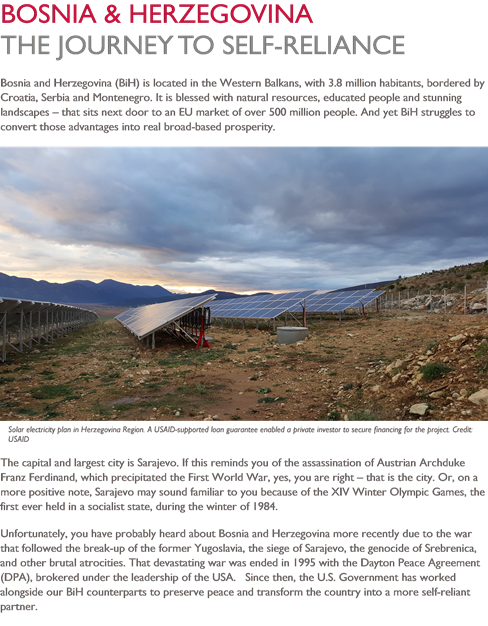Speeches Shim
Bosnia and Herzegovina (BiH) is located in the Western Balkans, with 3.8 million habitants, bordered by Croatia, Serbia and Montenegro. BiH is a country blessed with natural resources, educated people and stunning landscapes – that sits next door to an EU market of over 500 million people. And yet, it struggles to convert those advantages into real broad-based prosperity.
The capital and largest city is Sarajevo. If this reminds you of the assassination of Austrian Archduke Franz Ferdinand, which precipitated the First World War, yes, you are right – that is the city. Or, on a more positive note, Sarajevo may sound familiar to you because of the XIV Winter Olympic Games, the first ever held in a socialist state, during the winter of 1984. Unfortunately, you have probably heard about Bosnia and Herzegovina more recently due to the war that followed the break-up of the former Yugoslavia, the siege of Sarajevo, the genocide of Srebrenica, and other brutal atrocities. That devastating war ended in 1995 with the Dayton Peace Agreement (DPA), brokered under the leadership of the United States. Since then, the U.S. Government has worked alongside our BiH counterparts to preserve peace and transform the country into a more selfreliant partner.
One example of this effort is our long-term efforts to reform the energy sector.
During the war, the damage to the country’s electricity network was devastating. Every power line that crossed the front line was damaged, along with substations. Because of damage to both hydro and thermal power plants, even people living in areas with a functional network experienced frequent and prolonged power outages. Over the first six, postwar years, international donors, led by USAID, accomplished the extraordinary feat of rebuilding the power system and delivering a near-constant supply of power to citizens and businesses. By 2001, service was restored throughout the country, and BiH had become a net electricity exporter!
At that point, the “hardware” task of reconstructing energy infrastructure was complete. USAID, therefore, shifted focus toward the “software” tasks – putting the regulatory institutions in place to provide for a smooth functioning of the system and to meet the needs of a growing economy. In 2001, there were no energy regulatory commissions, and no primary energy laws, at all. Regulatory commissions for energy in BiH work to ensure that the commercial processes in the open electricity market are carried out in a transparent and non-discriminatory manner, and that both electricity companies and customers play by the same rules. They also monitor the technical processes that are important for the functioning of electricity systems, making sure that the security of supply is maintained at all times.
BiH has joined the EU Energy Community - an international organization that brings together the EU and its neighbors to create an integrated, pan-European energy market - and reform efforts in the electricity sector are now centered on conforming to treaty requirements. The Energy community was established between the EU and a number of third countries to extend the EU internal energy market to Southeast Europe. The participating countries commit to developing an adequate regulatory framework and to liberalize their energy markets, meaning they will create conditions favorable to private investment and competition. Competition has emerged as independent (privately owned) suppliers have offered more competitive prices to business customers than those offered by the existing, state-owned power utilities. So far, around 8,000 business enterprises have switched their form of supply and are being supplied through negotiated contracts.
Self-reliance also requires attracting more private capital and investment. To help potential investors navigate BiH’s complex bureaucratic system, USAID recently published a “Guidelines for Investors”. The comprehensive document outlines requirements for all types of power facilities — from thermal power plans to wind, solar, and biomass.
As this article “goes to press,” USAID, along with BiH and international partners, is organizing the 5th annual Energy Summit that will gather over 400 key stakeholders from BiH, neighboring countries and the EU Energy Commission to discuss further Energy Transition. The Summit will be a forum to push forward remaining reforms, including those related to gas market regulation and energy efficiency that are needed for BiH to fully realize its potential as a full and active member of the European Energy Community.
Significant progress has been achieved in restoring crucial material and social infrastructure after the devastation of the war. Bosnia and Herzegovina continues to make progress on its journey to selfreliance, but this remains a complicated process. The Country Roadmap, together with supplemental indicators, show continued commitment gaps in the business environment, as well as security (mostly due to the continued lack of thorough reconciliation), and in education quality. USAID BiH is focusing on refining and developing our programs in these areas.


Comment
Make a general inquiry or suggest an improvement.